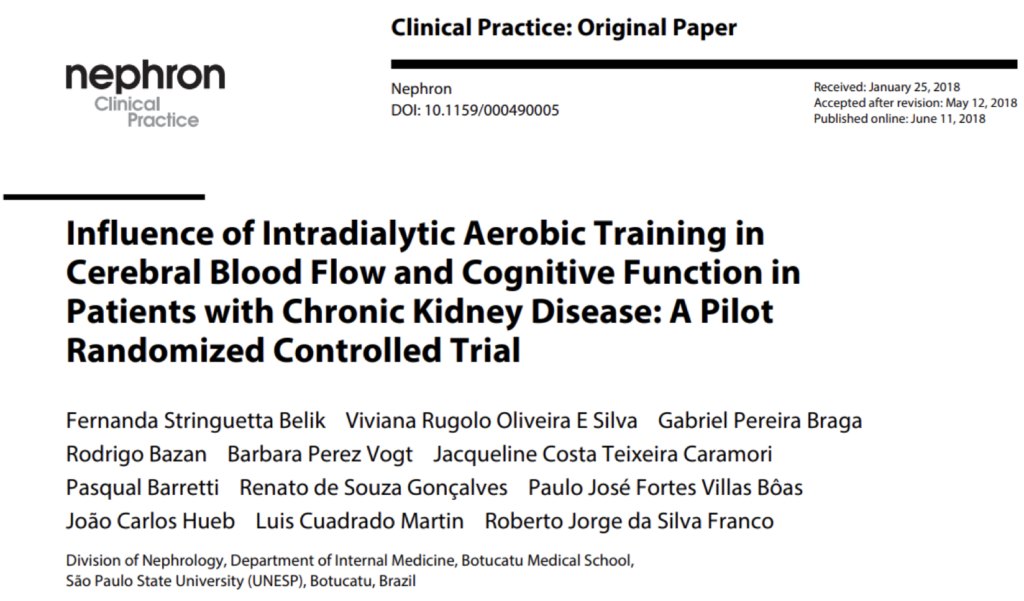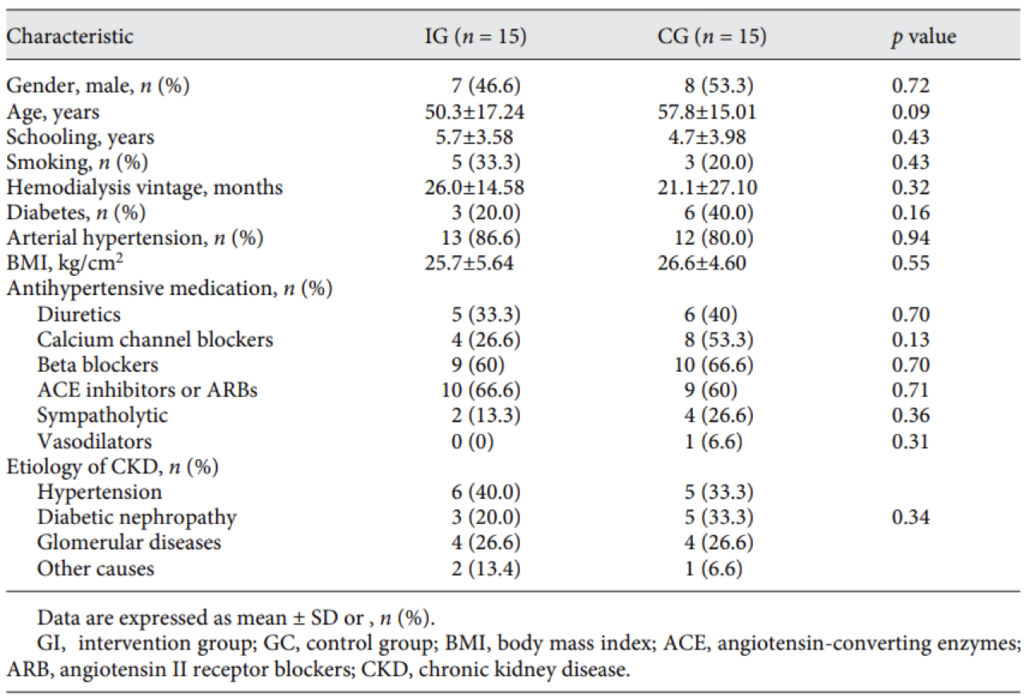こんにちは、腎リハラボへようこそ。理学療法士の優です。今回は、“透析中運動療法は認知機能改善に有用か?”というテーマについて話していきたいと思います。2022年の診療報酬改定で透析時運動指導等加算が新設され、取り組む施設も増えてきているかと思います。それでは始めていきましょう!
紹介する文献はコチラ!

今回はこの流れに沿って進めていきたいと思います!
- 背景
- 方法
- 結果
- まとめ
1. 背景
CKDは認知機能障害の独立した危険因子である。
Etgen T, et al. Chronic kidney disease and cognitive impairment: a systematic review and meta-analysis. Am J Nephrol 2012;35:474–482
Kurella Tamura M, et al. Vascular risk factors and cognitive impairment in chronic kidney disease: the Chronic Renal Insufficiency Cohort (CRIC) study. Clin J Am Soc Nephrol 2011;6:248–256
Yaffe K, et al. Chronic Renal Insufficiency Cohort Investigators: chronic kidney disease and cognitive function in older adults. J Am Geriatr Soc 2010;58:338–345
Kurella Tamura M, et al: Kidney function and cognitive impairment in US adults: the Reasons for Geographic and Racial Differences in Stroke (REGARDS) Study. Am J Kidney Dis 2008;52:227–234
HD患者における認知機能障害の有病率は60%にのぼる。
Kurella Tamura M, et al. Vascular risk factors and cognitive impairment in chronic kidney disease: the Chronic Renal Insufficiency Cohort (CRIC) study. Clin J Am Soc Nephrol 2011;6:248–256
Murray AM, et al. Cognitive impairment in hemodialysis patients is common. Neurology 2006;67:216–223
脳血管疾患は、健常者とCKD患者において認知機能障害の主な危険因子である。
Radic J, et al. The possible impact of dialysis modality on cognitive function in chronic dialysis patients. Neth J Med 2010;68: 153–157
Bugnicourt JM, et al. Cognitive disorders and dementia in CKD: the neglected kidney-brain axis. J Am Soc Nephrol 2013;24: 353–363.
Jesus PA, et al. Cognitive dysfunction in congestive heart failure: transcranial Doppler evidence of microembolic etiology. Arq Neuropsiquiatr 2006;64:207–210
CKD患者に脳血管疾患と心血管疾患が多い事を考慮すると、彼らの認知機能障害は微小循環障害に仲介されている可能性がある。
Drew DA, et al. Anatomic brain disease in hemodialysis patients: a cross-sectional study. Am J Kidney Dis 2013;61:271–278
Weiner DE, et al. Cognitive and physical function in chronic kidney disease. Curr Opin Nephrol Hypertens 2014;3:291– 297
Skinner H, et al. Cerebral haemodynamics in patients with chronic renal failure: effects of haemodialysis. Br J Anaesth 2005;94:203– 205
Stefanidis I, et al. Influence of hemodialysis on the mean blood flow velocity in the middle cerebral artery. Clin Nephrol 2005;64: 129–137
Ivey FM, et al. Improved cerebral vasomotor reactivity after exercise training in hemiparetic stroke survivors. Stroke 2011;42:1994– 2000
高い身体活動量と高い認知機能は関連する。
Barber SE, et al. Is there a role for physical activity in preventing cognitive decline in people with mild cognitive impairment? Age Ageing 2012;41:5–8
健常成人において、高い脳血流量と有酸素運動は関連する。
Ainslie PN, et al. Elevation in cerebral blood flow velocity with aerobic fitness throughout healthy human ageing. J Physiol 2008;586.16:4005–4010
CKD患者における身体活動量および有酸素運動能力は低い。
Koufaki P,et al. The BASES expert statement on exercise therapy for people with chronic kidney disease. J Sports Sci 2015;25:1–6
Greenwood SA, et al. Effect of exercise training on estimated GFR, vascular health, and cardiorespiratory fitness in patients with CKD: a pilot randomized controlled trial. Am J Kidney Dis 2015;65:425–434
Johansen KL, Painter P. Exercise in individuals with CKD. Am J Kidney Dis 2012;59:126–134
有酸素運動は脳卒中患者の脳血流量を高める。
Ivey FM, et al. Improved cerebral vasomotor reactivity after exercise training in hemiparetic stroke survivors. Stroke 2011;42:1994– 2000
Endres M, et al. Mechanisms of stroke protection by physical activity. Ann Neurol 2003;54:582–590
Gertz K, et al. Physical activity improves long-term stroke outcome via endothelial nitric oxide synthase-dependent augmentation of neovascularization and cerebral blood flow. Circ Res 2006;99:1132–1140
この研究の目的は、透析患者における透析中運動療法が、脳血流量および認知機能に与える影響を明らかにすることとされています。
2. 方法
2012年~2014年に単施設における30名の血液透析患者を対象に行われたランダム化比較試験です。介入群は、4か月の間、週3回、透析中運動療法として透析前半2時間以内に、ストレッチおよび最大心拍数の65~75%の強度でエルゴメーターを用いた有酸素運動を30~45分実施しています。
3. 結果
15名の介入群およびコントロール群における背景や病歴等に有意差なし

介入群において、MMSEで測定した認知機能が有意に改善

介入群において、最大および平均脳血流速度が、それぞれ有意に改善


介入群において、脳血管の拍動係数が有意に改善

4. まとめ
健常者を対象としたメタアナリシスでは、身体活動と認知機能改善が関連していた。
Angevaren M, et al. Physical activity and enhanced fitness to improve cognitive function in older people without known cognitive impairment (Review). Cochrane Library 2008;3
健常者(特に高齢者)において、身体活動は脳の健康、認知機能、認知症リスクに対する予防的な効果が確認された。
Paillard T. Preventive effects of regular physical exercise against cognitive decline and the risk of dementia with age advancement. Sports Med Open 2015;1:20
Van Gelder BM, et al. Physical activity in relation to cognitive decline in elderly men: the FINE Study. Neurology 2004; 63:2316–2321
Schuit AJ, et al. Physical activity and cognitive decline, the role of the apolipoprotein e4 allele. Med Sci Sports Exerc 2001;33:772–777
いくつかの生理学的メカニズムを用いて、認知機能に対する身体活動の有益な効果と脳血流の増加を説明することができる。運動の神経保護効果を説明するために考えられているメカニズムは、心血管、免疫、および神経栄養シグナル伝達である。
Phillips C, et al. Neuroprotective effects of physical activity on the brain: a closer look at trophic factor signaling. Front Cell Neurosci 2014;8:170
すでに明確にされている身体活動による心血管への利点は、小血管の状態改善、脳血流の増加、栄養素の伝達であり、これらは脳機能の最適化に役立つ。
Vuori IM, et al. Physical activity promotion in the health care system. Mayo Clin Proc 2013;88:1446–1461
Schmidt W, et al. Train the vessel, gain the brain: physical activity and vessel function and the impact on stroke prevention and outcome in cerebrovascular disease. Cerebrovasc Dis 2013
Swain RA, et al. Prolonged exercise induces angiogenesis and increases cerebral blood volume in primary motor cortex of the rat. Neuroscience 2003;117:1037– 1046
運動は急性的に酸素等の消費増加に応じて心拍出量を増加させ、脳血流量も増加する。
Rivera-Brown AM, Frontera WR. Principles of exercise physiology: responses to acute exercise and long-term adaptations to training. PM R 2012;4:797–804
身体活動は海馬の血流量を改善し、解剖学的および生理学的な変化をもたらし、認知機能障害リスクの低下に関連する可能性がある。
Lombroso P: Learning and memory. Rev Bras Pisquiatr 2004;26:207–210
Burdette JH, et al. Using network science to evaluate exerciseassociated brain changes in older adults. Front Aging Neurosci 2010;2:23
健常高齢者において、身体活動と海馬容量の増加に関連性が示された。
Colcombe S, Kramer AF. Fitness effects on the cognitive function of older adults: a meta-analytic study. Psychol Sci 2003;14:125– 130
これらの先行研究の結果を踏まえたうえで、この研究の強みは、これは血液透析患者における透析中の運動が認知機能と脳血流量の改善に対する有用性を示すはじめてランダム化比較試験だということである。また、これはパイロットスタディであるということからも、今後より大規模な研究結果が出てくることが期待できます。
まとめです。
透析中の有酸素運動は、脳血流量の増加に関与し、観察されたほとんどの動脈で最大および平均血流速度が増加し、認知機能改善のメカニズムである可能性が示唆されました。
最後までご覧いただきありがとうございました!
youtubeでは動画も公開しておりますので、是非ご視聴ください!

